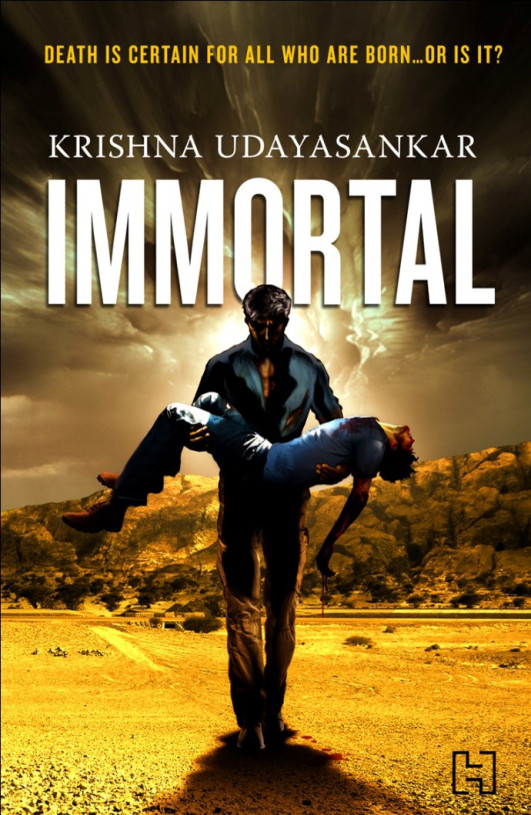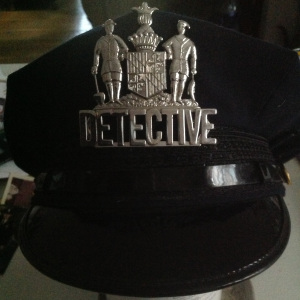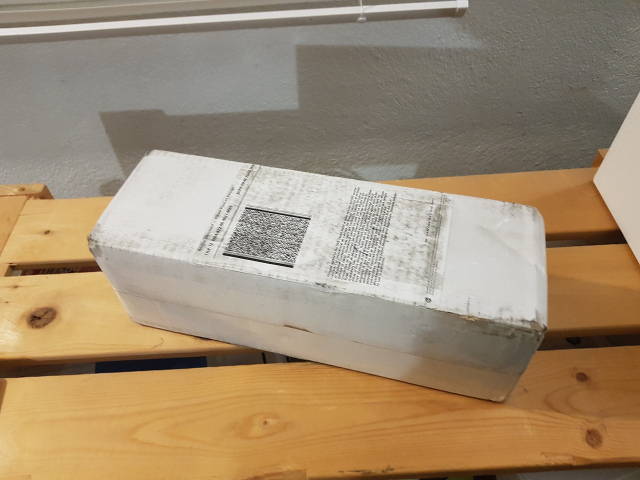“As the world had changed, so had its morals. I, however, chose to remain the man I’d been.”
As many of you know by now I have a fascination with books in which female archaeologists solve mysteries. It was on the hunt for another such book that I came across Immortal by Krishna Udayasankar. The protagonist isn’t a woman, but it promised me my dose of history, with a dash of mythology. I really didn’t need any other reason to grab it!

As I began reading it, it kept reminding me of Doctor Who. I figured it was because of the protagonist –he, like the doctor, is out of place in time. Then it suddenly struck me, that it was the cover! The cover of this book subconsciously reminded me of an image from Season 7 of Doctor Who, of the Doctor carrying Amy.
But then, as I read on, I realized that the cover is not all Immortal had in common with Doctor Who. Both have huge doses of science and history. Both have a rather enigmatic main character, supported by a clever, charming companion. Both main characters ask others to refer to themselves as the ‘Doctor’ and the ‘Professor’, respectively. Both have pulse quickening adventure and thrills. But Immortal has something Doctor Who does not–it has just a hint of mythology.
Our protagonist here is a character from the Hindu epic The Mahabharata – Ashwatthama, who in the epic is sentenced to a cursed life of diseased immortality for committing a great war crime. The book takes a different view on this –it gives Ashwatthama the ability to regenerate (making him disease free) and makes the cause of his immortality a mystery that Ashwatthama, himself, has been trying for 4000 years to solve.
When the book begins, Ashwatthama is, in current times, under the name of Professor Bharadwaj, an expert historian and treasure hunter (though he hates to be called that!). He is approached by the mysterious Maya Jervois ( bi-racial), who in on the trail of the Vajra–the philosopher’s stone of alchemy, which grants immortality. Even though Bharadwaj is skeptical, events unfold in such a way that Bharadwaj, his companion Manohar (who is gay), and Maya are soon thrown into the search for the elusive Vajra.
Needless to say, the book is fast paced and thrilling. I pulled an all-nighter to read it because I just could not put it down. There are some fantastic action scenes and lots of twists and turns as we visit a variety of settings, from temple-towns to harsh deserts.
And yet, the book manages to weave in a subtle thread of philosophy through it all. It gives one enough to think about the meaning of life and death, and the time in between. I especially appreciate how the writer has defined terms like ‘karma’ and ‘tantra’ which are largely misunderstood by the West.
One thing I loved about the book was the characterizations. Each character has a complete identity, and one begins quickly, to care for them. Especially admirable is the way the character of Professor Bharadwaj/Ashwatthama has been written.Unlike other contemporary mythology-based novels which usually deify or vilify the characters, and make them larger than life, Krishna Udayasankar keeps Ashwatthama refreshingly human, albeit one with a long and complicated history. He is a treasure hunter, but his search, unlike Indiana Jones, is driven by his own internal desperation. The author captures well the separateness and utter loneliness of a man cursed by his own karma to live out of his time, and who has to pit his memories of men and women he knew against the adoration of a populace that now worships them as.
Historical figures like Newton, Oscar Wilde and Genghis Khan are mentioned by Professor Bharadwaj as acquaintances. In the same breath, references are made to characters from The Mahabharata, as his contemporaries. The author melds history and mythology, science and folk-lore with finesse, making it easy to suspend disbelief.
The only disappointment for me in the book was the ending. I won’t say much because I don’t want to give out any spoilers, but I did not get the resolution I needed and wanted. I understand why the author took the direction she did, but I can’t help wishing she’d done something different. Also, some of the “twists” came across as contrived. But this is a personal grievance and it will not stop me from eagerly recommending the book.
I don’t know if the author intends to make this a series, but if she is, then I’m certainly not complaining! As it is, this book has made me want to go read some of the authors previous work —The Aryavarta Chronicles, which are her retelling of The Mahabharata. I want to see Ashwatthama in his own time, even as I look forward to seeing him around more in the future!
Have you read this book? Does this book remind you of any other books? Have you read any other books by Krishna Udayasankar? Let me know in the comments!
Author Bio: http://www.hachetteindia.com/Author_Details.aspx?AuthorId=13464
Advertisements Share this:- More





